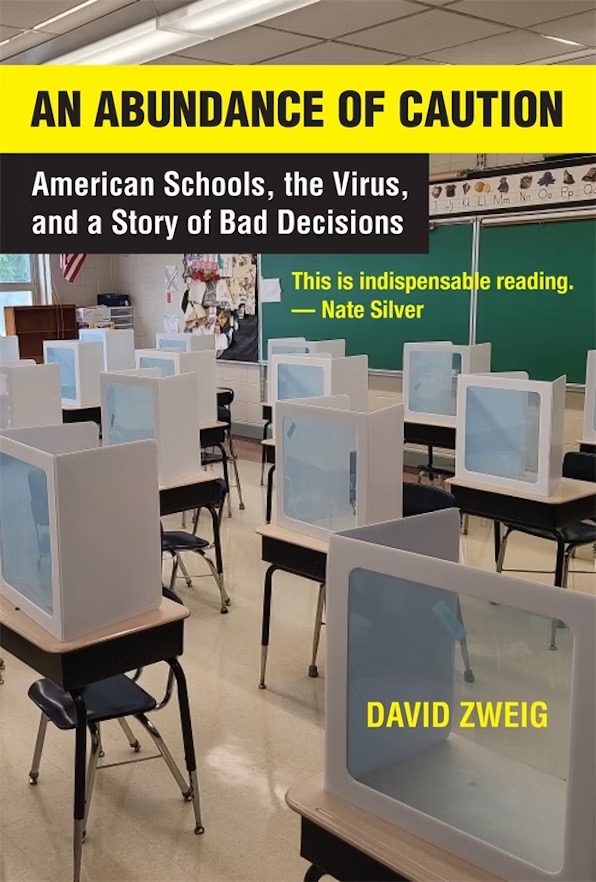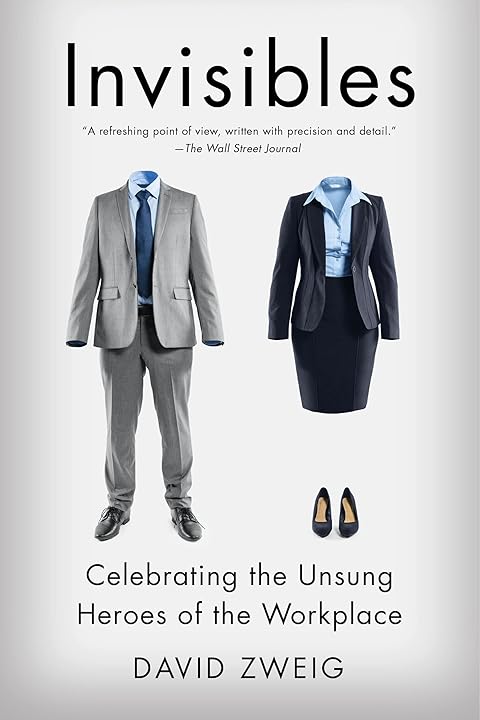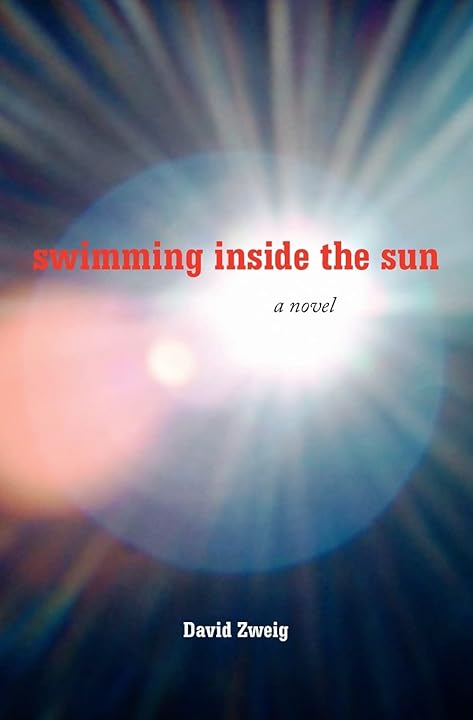Books

An Abundance of Caution
Available at...
An Abundance of Caution is a devastating account of the decision-making process behind one of the worst American policy failures in a century—the extended closures of public schools during the pandemic. In fascinating and meticulously reported detail, David Zweig shows how some of the most trusted members of society—from Pulitzer Prize–winning journalists to eminent health officials—repeatedly made fundamental errors in their assessment and presentation of evidence. As a result, for the first time in modern American history, healthy children were barred from school. Millions of them did not set foot in a classroom for more than a year.
Since the spring of 2020, some students in Europe had been learning in person. Even many peers at home—in private schools, and public schools in mostly “red” states and districts—were in class full time from fall 2020 onward. Whatever inequities that existed among American children before the pandemic, the selective school closures exacerbated them, disproportionately affecting the underprivileged. Deep mental, physical, and academic harms—among them, depression, anxiety, abuse, obesity, plummeting test scores, and rising drop-out rates—were endured for no discernible benefit. As the Europeans had shown very early, after they had sent kids back to class, there was never any evidence that long-term school closures, nor a host of interventions imposed on students when they were in classrooms, would reduce overall cases or deaths in any meaningful way.
The story of American schools during the pandemic serves as a prism through which to approach fundamental questions about why and how individuals, bureaucracies, governments, and societies act as they do in times of crisis and uncertainty. Ultimately, this book is not about Covid; it's about a country ill-equipped to act sensibly under duress.
REVIEWS
Stop back soon. Reviews are currently being published.

Invisibles
Available at...
Journalist David Zweig explores what we can learn about satisfaction and achievement from the Invisibles among us—the fact checkers, anesthesiologists, structural engineers, and other professionals who derive satisfaction from anonymous work despite living in a culture of praise. Driven by narratives of Invisibles in action, complemented by perspectives and studies from leading psychological, sociological, and business authorities, Invisibles offers readers multiple levels of enjoyment, from over-the-shoulder who knew?! journeys into some of society’s fascinating and often obscure lines of work, to new insights from the researchers and thinkers who attempt to quantify and qualify our relationship to our work, to possible answers to the biggest questions of what makes for a rich and meaningful life.
REVIEWS
“A fascinating tour of the hidden landscapes on which human society actually operates. This will change the way you see the world and, hopefully, your place within it.”
– Douglas Rushkoff, author of Present Shock
“Top Business Book To Read in 2014”
– QZ.com
“A refreshing point of view, written with precision and detail.” –– The Wall Street Journal
“An interesting and important book. It takes us a step closer to understanding how we can be happier and lead more meaningful lives. We can all benefit from the examples of Invisibles.”
The Buffalo News
“The Radical Power of David Zweig’s ‘Invisibles’ . . . precise and insightful.”
Flavorwire
Named one of the “20 Best Books of June”
iTunes
“One of the Best Books on Tech and Society in 2014”
Tech Republic
“Inspiring” #4 in the Top Ten Business Books of 2014
D&A Magazine
“The great workers who get no credit in a self-promotion obsessed world.”
The Washington Post
Invisibles “offers quiet and thoughtful space to consider the inner value of high-quality work.”
Booklist
“You’ve Been Obsessing Over Your Likes and Retweets Way Too Much”
Wired
“Invisibles perform key tasks without seeking credit. And they’re in high demand.”
The New Republic
“Invisibles are engaged in the most radical act of our era: not talking about themselves. . . They have cracked the code for a satisfying life.”
The Los Angeles Times
“There are high-functioning invisibles in all factions of the economy, and they operate almost in defiance of the prevailing wisdom that self-promotion and self-regard bordering on narcissism are the way to get noticed.”
Maclean’s
“The wisdom of this advice is undeniable.”
New York
“Zweig challenges the pervasive notion that the people who spend the most time getting others to pay attention to them win.”
Fortune
“[A] fascinating new book”
Strategy+Business
“Could Invisibility Lead to Career Fulfillment?”
TED ROI
“Invisibles is an important and timely book. It is also great fun to read. Not only does Zweig do a wonderful job of illustrating his thesis that invisible work is both more rewarding and usually more productive than work that is done for external recognition, we also learn a great deal about the world’s that these Invisibles inhabit.”
Inside Higher Ed
“Are You An Invisible In A World of Visibles?”
Psychology Today
“The Self-Promotion Backlash”
The New York Times
“Why ‘Invisible’ People Can Be The Most Successful”
Business Insider
“The Perks of Being Invisible at Work”
The Wall Street Journal (Q&A)
“Invisibles is this year’s smart business book”
Flavorwire
“Those who toot their own horn, by nature get the most attention. But maybe those working hard at their jobs rather than working hard to raise their own profiles are the people who will get ahead.”
Fast Company
“Entertaining. The book’s strength is in Zweig’s portraits of those dedicated workers behind the scenes . . . The author’s genuine respect for his subjects shines through and keeps these stories lively.”
Publishers Weekly
“Zweig delivers an engaging read . . .This well-researched and accessible title will be of high interest to business, psychology, and sociology students.”
Library Journal
Named one of “11 Smart Business Books You Should Read This Summer”
250Words.com
“A fascinating new book”
Next Avenue
“Expect Invisibles to be highly influential.”
– Nilanjana Roy, author of The Wildings and writer for the International New York Times
“Invisibles explains why some of the world’s most talented, accomplished people choose to fly under the radar. An excellent book.”
– Adam Grant, Wharton professor and bestselling author of Give and Take
“The genius at the top doesn’t make their team look good. It’s a great team that makes the guy at the top look like a genius…and Invisibles proves it.”
– Simon Sinek, bestselling author of Start With Why
“Invisibles is a one-book cultural revolution,, fighting the current cultural tide toward narcissistic self-promotion with the truth that real satisfaction is often silent.”
– Jean Twenge, co-author of The Narcissism Epidemic
“Building upon his 2012 Atlantic article “What Do Fact-Checkers and Anesthesiologists Have in Common,” in his nonfiction debut, journalist Zweig presents an entertaining, good-natured exploration of the mindsets and psyches of “invisibles”—people whose passions have required years of training and experience, but who happily toil in obscurity for the love of the work itself, rather than fame. As Zweig notes, it’s this very single-mindedness in the quest for excellence—and the emphasis on getting the job done—that research suggests correlates with both happiness and business success. The book’s strength is in Zweig’s portraits of those dedicated workers behind the scenes, including a ghost writer; a perfume maker for celebrity brands; a structural engineer; an interpreter at the United Nations; a cinematographer; and a guitar tech for rock bands. The author’s genuine respect for his subjects shines through and keeps these stories lively.”
Publishers Weekly
“An encouraging salute to the world behind the scenes, where the “Invisibles” allow the show to go on. Journalist Zweig suggests, with considerable merit, that, in our culture of wanting it all, we have forgotten the hard work of getting there—that to be Tom Brady quarterbacking on Sunday, you must also be a game-film drudge and a gym rat. More to the point, that invisible work has its own beauty and meaning. The author points to people who take pride in elevating anything to an art, who lose and find themselves in projects that make a significant impact on our lives, leaving us happy while delivering the pleasure and self-respect from doing the job properly. Zweig profiles a handful of highly skilled individuals “whose roles are critical to whatever enterprise they are part of”—e.g., the perfumer behind Sean Combs’ fragrance Unforgivable (Combs became “the first male celebrity with a prestige cologne”); the structural engineer who enables the architect’s vision of a skyscraper; and, perhaps most impressive, the U.N interpreter who “hears one language, interprets it into another language in her head, then speaks the new language while at the same time continuing to listen to and interpret the next lines of the original language, a practice known as simultaneous interpretation….As long as the speaker is talking, she is interpreting.” Zweig notes three traits that these unsung individuals possess: responsibility, meticulousness and ambivalence regarding recognition. These traits are fine, to be sure, but the author’s vignettes really drive the point home. Guitar tech, fact checker, piano tuner, cinematographer, ghostwriter et al.—it is workmanship, curiosity, demanding internal standards, deep immersion and cooperative instincts that bring a rewarding life. In Zweig’s fascinating world, the limelight doesn’t hold a candle to the satisfaction of hard work well done.”
Kirkus Reviews
INTERNATIONAL PRESS:
“Life as an invisible isn’t for everyone. But focus too much on the opposite, on making yourself seen, and you might wake one day to realise you’re all visibility – with nothing important to be visible for.”
The Guardian – UK
“The Art of Shameless Self-Promotion”
The Sydney Morning Herald – Australia
“Unsung heroes understand what it means to live a rich life”
The Courier Mail – Australia
“Being skeptical about the art of shameless self promotion”
The Age – Australia
“Les ‘invisibles’, ces salariés qui s’épanouissent dans l’ombre”
L’Express – France
“Enquête sur les nouveaux invisibles: lesépanouis”
Le Monde – France
“Gli Invisibili: nel nuovo libro edito da Egea, il dietro le quinte dei big”
FirstOnline – Italy
“Os Invisíveis”
Jornalde Negocios – Portugal
“10 profissões invisíveis, das quais quase não se fala”
Exame – Brazil
“La importancia de los ‘invisibles’”
El Comercio – Peru
“당신의 회사가 잘나가는 건…`조용한 영웅`이 많기 때문 – Hello CEO – There Are Many Quiet Heroes”
Maeil Business Newspaper – South Korea
“הבלתי נראים // המצליחנים שלעולם לא תשמעו עליהם”
Haaretz, The Marker – Israel
“Los empleados invisibles que hacen perfecta a tu empresa”
CNN Expansion – Mexico

Swimming Inside The Sun
Available at...
On the verge of success, struggling New York City musician Daniel Green has his life’s dream snatched from him. Despondent, Dan seeks solace and answers from the comforts of women, great thinkers from Marx to Kierkegaard, and the security of rice milk. Suffering from a darkly comical state of extreme self-consciousness, Dan begins to lose his grip on reality, and in a meta-fictional twist, the narrative shifts from first to third-person as his depersonalization peaks. All the while, the signs of his existential dilemma become, literally, the writing on the wall, as his studio apartment is increasingly taken over by The Notes he can’t seem to stop writing. Battling loneliness and a mind that can no longer discern between fiction and real life, Dan’s only hope may be the redemptive force of music. In a culture obsessed with tales of winners’ ascensions to the top, Dan Green’s story, defiantly, irreverently, is about what happens when you fail and the roads you take to figure out what next?
REVIEWS
— BabyGotBooks
“A terrific debut from a talented writer… The author’s prose revels in smart literary turns … packs plenty of emotional resonance”
— Kirkus
“The more we follow [protagnist Dan Green]… the closer we come to understanding that fragile joy that accompanies the creation of art, and music in particular.”
— HebrewSchoolSounds
“There are so many reasons to like David Zweig’s debut… the writing is tight and funny, even sad, but worth your time. Please look for this book, you won’t be disappointed.”
— ThreeGuysOneBook
“The novel is so well written… It is such a pleasure to read a book that made me feel so much.”
— HeyBrooklyn
“An insightful look at the creation of art and the emotional wreckage that can come from putting all of yourself into something” … “an immersive view of the demons of creativity. I found it to be an engrossing and ultimately rewarding novel.”
— BabyGotBooks (second review)
“Really well written and darkly humorous… I seriously dug David Zweig’s new book: Swimming Inside the Sun”
— Fucked in Park Slope
“A powerful piece of work, and I must say truthfully, one of the better [debut novels] i’ve read in a long while.”
— FFanzeen
“I really like the writing style… engaging and vividly depicted New York City… provokes a strong reaction.”
— LifeAndTimesOfANewNewYorker
“I actually had to walk away from the story for several days, as Dan’s self-destruction was presented so realistically that I felt I was embarking on a journey with him. I felt a bit insane… the emotions, though extreme, were easy to relate to.”
— ReadingForSanity
“This deep character study hooks the audience… intense and well written.”
— Midwest Book Review
